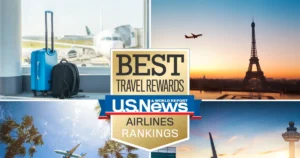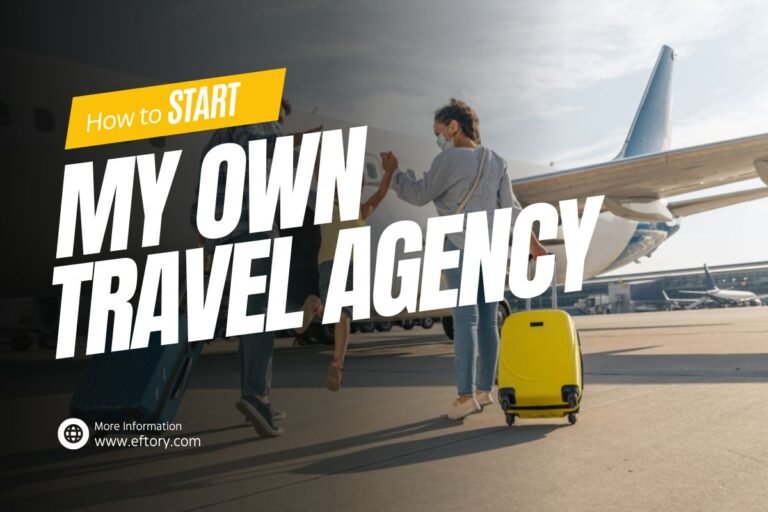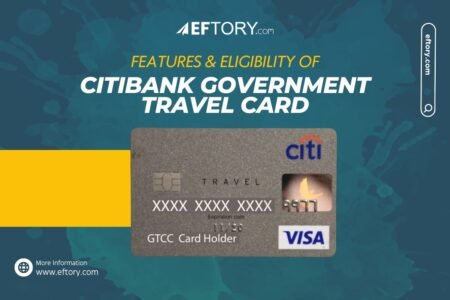Introduction to Travel Agency:
- A travel agency acts as a middleman for trips, arranging transportation, accommodations, and activities to craft your dream vacation, and it can help its corporate clients to bring down the expenses of their travels. Travel agencies can avail their customers with favorable costs, by making the bookings for cheap rates, ticket management, and much more.
- Being a travel agent has lots of benefits as good ones involve flexible work hours, the lovely feeling of having your customer book a family holiday in an affordable destination, and the fulfillment of running your own business and watching it go strong and develop to be what you first intended of it to become. Tourism and travel are lucrative businesses that are very profitable so the fear for running into money issues can be ruled out as you start this business.
- The cost of the agency’s establishment can vary. At the very least you’re going to need a computer, an online, and a professional website, which may be over 1000 dollars. Setting up a physical store for agencies can be expensive, sometimes reaching six-figure costs.
Essential Skills for Running a Travel Agency:
- Destination Expertise
- Travel Technology
- Marketing and Sales
- Financial Management
- Website Management
- Communication Skills
- Customer Service
- Problem-Solving Skills
- Organizational Skills
- Negotiation Skills
Certifications that increase your Credibility as a Travel Agent:
Here are some well-regarded certifications offered by travel industry organizations:
- Certified Travel Associate (CTA): The Travel Institute, an authorized provider, will impart this basic travel industry course. The curriculum covers basic industry knowledge and skills.
- Certified Travel Counselor (CTC): A more advanced program by The Travel Institute, focusing on in-depth travel planning, customer service, and business management.
- Travel and Tourism Professional (TTP): Given by IATA, or the International Air Transport Association, this program empowers you with a skill set that can help you navigate the global tourism arena.
- Verified Travel Advisor (VTA): Bestowed upon by ASTA, the American Society of Travel Advisors, this program certifies that you possess the required Travel Trade skills.
How to Start My Own Travel Agency?
Following are the steps & Strategies to start a Travel Agency.
Niche Selection:
Niche selection in travel agencies is all about specializing in a specific market segment rather than swimming across the ocean of the overall travel market. Rather than having mass-market offerings to everyone, you concentrate on a specific traveler type and trip even though the target audience may travel differently. Thus you can be regarded as the leader and master of the content area by understanding their special demands and preferences. So, niche selection can be a very very important decision for your travel agency’s success.
Examples of Travel Niches:
- Adventure Travel
- Luxury Travel
- Budget Travel
- Family Vacations
- Cultural Travel
- Solo Travel
- Wellness Travel
- Romantic Getaways
- Ecotourism
- Culinary Travel
- Volunteer Travel
- Cruising
Benefits of Niche Selection:
- Expertise & Credibility: Distinguishing yourself in the market by focusing on the niche helps you to become the expert of that destination. First and foremost, you’ll develop a deep knowledge of destinations as well as products and services. In addition, you’ll learn to identify and exploit the travel styles that would resonate with your targeted niche. Such experience is the foundation of clients’ trust and advice on any topic regarding their travel choices. This will make you the client’s travel guru in travel-related issues.
- Stronger Vendor Relationships: You will engage with vendors that have main products that match your specialization and build stronger business ties which will definitely drive profit. For example, Adventure travel agencies may consequently develop strong ties with tour operators who specifically master different adventure activities whether be it white-water rafting or mountain climbing. These positive impacts will result in more advantageous deals, secret offers, and personalized assistance which you can provide to clearly improve and diversify your services for your clients as compared to the travel agencies belonging to the mass market.
- Competitive Advantage: The tourism industry is a large and difficult one to manage with different types of competitors within it. Eclipsing the crowd, you gain uniqueness through the expression of a niche. People always look for one more information, which is what individual desires and preferences are, when searching for a travel agency. A well-defined niche makes your agency easily identifiable and puts you as a specialist for the dream vacation that they want, into their minds.
Market Analysis:

1) Understand Your Ideal Client:
Conduct a questionnaire, and find your target travelers based on their age groups, travel preferences, and spending habits. In the end, this will enable you to pinpoint and modify your services, marketing messages, and pricing policies in such a way that they will ring clear and true to them individually.
2) Niche Research:
Research the size of the niche market that you have selected. Can your business sustain itself when it comes to the bigger picture? Analyze competitors, and their level (strengths, weaknesses, and market share). This assists in reducing the spaces where your agency is not unique and identifying opportunities that set you unique from others.
3) Keep Updated on Industry Trends & Seasonality:
- Travel trends: Stay updated about the latest travel trends and popular destinations, and do a survey that helps you to analyze the public demand or interests.
- Seasonal fluctuations: Few have summer holidays, trips choosing to travel in crowds or a certain type, like skiing. Understanding the changing trends is essential in making your marketing campaigns, workforce, and pricing strategy better geared at both the low and the peak seasons.
4) Pricing Strategy and Profitability:
- Competitor pricing: Analyze your competitor’s pricing. This knowledge guide definitely and demonstrate you on how to offer a competitive but affordable & effective pricing strategy for your specialized market.
- Cost analysis: Taking marketing costs, supplier fees, and operational costs into account, adjust your pricing to guarantee the addition of healthy profit margins.
5) Identifying Business Opportunities:
- Emerging markets: Research probably multiple destinations or novel travel experiences that are attracting rising interest. By tailoring your business to the needs of this generation who are technology savvy and trend-orientated, you will improve the relevance and quality of your services.
- Partnerships and collaborations: Market analysis may get you affiliation with travel bloggers, tour operators offering niche services, and transport companies to cut down on travel costs and extend the reach of your brand.
6) How to Conduct Market Analysis?
- Secondary Research: Consider reading industrial reports, publications on travel, and government statistics related to tourism trends.
- Competitor Analysis: Research on competitor websites, social media accounts, and online reviews can introduce opportunities for improvement or strengthen your own brand’s online presence.
- Surveys and Focus Groups: You can gain more knowledge about what your possible clients like by requesting surveys and holding focus groups. Let them tell you their preferences and trip objectives.
Key Questions for Market Research in Starting a Travel Agency:
- Who would be most interested in using our travel services?
- What difficulties do our targeted audience deal with, and how could our company solve those problems?
- How do clients now respond to the problems that the travel agency of ours is going to cover?
- Are there any similar products, or competition out there yet?
- What approaches do our competitors use in their travel agency models?
- What technical features and services will we offer that other travel agencies don’t have?
- What technologies & tools do other brands/competitors use?
- What are the past trends in the travel industry?
We should see market analysis as a continuous process. With the growth of your travel business, fixedly check on the needs that are being found in your market research about industry trends, competitor activity, and clients. Continued improvements in that case will be a sustainable competitive advantage that will support your services and strategies for the long term.
Set your Budget:
Types of Travel Agencies:
- Online Agency (OTA): Lower startup costs, ideal for starting small or focusing on budget travel.
- Physical Location: Allows for more personal interaction but comes with higher rent and overhead costs.
- Hybrid Model: Consider a combination of online presence and a smaller physical office.
The startup costs for your travel agency can vary, as it depends on whether you choose a physical location or plan to operate solely online.
Online Travel Agency (OTA):
Pros:
- Online Travel Agencies have lower startup costs.
- They are flexible enough to operate from anywhere.
Cons:
- Less engagement with customers & personal touch compared to a physical storefront.

Typical Startup Costs for an Online Travel Agency:
Business Registration:
- Legal fees for registering your business (LLC formation, etc.) is $35-$500+.
- Business licenses and permits cost around about $100-$500+ (depending on your location).
Website Development: Cost depends on the complexity and functionalities of the website. Consider pre-built templates or custom development. Commonly web developers charge $1,000-$3,000+ for a website. Pre-build templates are generally less expensive than customized ones.
Travel Agency Booking Software: Simplifies booking processes, manages customer information, and incorporates with travel suppliers. The general subscription fee for travel agency booking software is $50-$500+ per month.
Marketing and Advertising: Develop a marketing strategy targeting your ideal client (website SEO, social media marketing, and online advertising). For marketing & advertising, you have to pay $100-$5,000+ per month.
Physical Travel Agency:
Pros:
- More personal interaction and engagement with clients.
- Potential for higher perceived value.
Cons:
- Higher startup costs due to rent, utilities, and office equipment.
Typical Startup Costs for a Physical Travel Agency (in addition to online costs):
Rent and Utilities: Lease for office space, and utilities (electricity, internet). Costs vary greatly depending on location and size. Generally, you would have to pay $1,000-$10,000+ per month.
Office Furniture and Equipment: Desks, chairs, computers, printers, phone system – $2,000-$10,000+.
Signage and Marketing Materials: Design and printing of brochures, flyers, and storefront signage. – $500-$2,500+.
Other Operational Expenses:
- Professional Liability Insurance: Protects your business from potential lawsuits. – Costs vary depending on coverage limits.
- Travel Supplier Fees: Commissions earned when booking travel through suppliers (hotels, airlines, etc.). Factor this into your pricing model.
- Accounting and Legal Fees: Ongoing costs for bookkeeping, tax filing, or potential legal consultations. Generally $100-$1,000+ per month (depending on complexity).
Create your Brand:
Your brand is the most important aspect of your agency of travel. It is a distinct feature that sets you apart from other companies competing for the same audience and resonates with your target client. Here’s how to create a strong travel agency brand:
1. Define Your Brand Identity:
Mission and Values: What is your agency’s purpose? What values will guide your operations and client interactions?
Target Audience: Are you specifically targeting individuals, families, or the workplace, so your message better aligns with your brand? The first thing you need to work on is to learn what your perfect traveler is like. What are their personality, traveling styles, and aspirations for their trip?
Brand Voice and Personality: How would you like to come through and what emotions are you trying to convey, Fun or adventurous, Sophisticated or luxurious? Set a consistent voice across all communication channels.

2. Develop a Visually Appealing Brand Identity:
- Logo Design: Being a foundation of your brand create a unique logo, which distinguishes you from competitors.
- Color Palette: Select colors from the spectrum that trigger feelings and are consistent with your business ideas (for instance, blue symbolizes reliability and green is for the environment).
- Imagery: To represent what you offer through travel, use good-quality pictures and videos that show the anticipated travel experiences.
3. Build Brand Consistency:
- Develop a Brand Style Guide: This guideline ensures consistency in your logo usage, color schemes, fonts, and messaging across all platforms.
- Website Design: Your website is your online shop and it must be created in a way that is both appealing and easy to use or else people will leave without making a purchase. It should be user-friendly, visually appealing, as well as complimenting your brand identity.
- Social Media Presence: Keep the same brand image throughout all the social media channels, be it on Facebook, Instagram, etc.
Register Your Travel Agency:
The process for legalized traveling agency’s enrollment varies with location. Here’s a general roadmap to get you started:
1. Choose a Business Structure:
- Sole Proprietorship: Simplest structure, but the owner has unlimited liability.
- Limited Liability Company (LLC): Provides personal liability protection for the owner(s).
2. Business Name Registration:
- Check for availability of your brand name with your state or local government agency.
- Do the necessary paperwork to register your chosen business name.
3. Obtain Business Licenses and Permits:
Do research on the permits and licenses needed by a travel agency to operate from your location. This can include a municipal business license, seller’s permit, or travel agency license.
4. Register for Taxes:
Get a federal tax ID number and register for any applicable state and local taxes.
5. Insurance Considerations:
Take a look at various options for professional liability insurance as well as errors, and omissions liability (E&O) insurance to reduce your company’s liability exposure.
Build Partnerships:

Maintaining strong partnerships is necessary for speeding up agency development.
Identify Potential Partners:
Travel Suppliers: The first step to identifying your competitors and gauging the level of the competition is to narrow down industries relevant to your niche from the sector like hotels, travel agencies, cruise lines, tour operators, activity operators, and so forth.
Complementary Businesses: You can fit in several different transportation providers or names of restaurants, attractions, and activity providers that belong to your niche destination.
Industry Organizations: Travel agency associations, tourism boards, and travel and tourism direct marketing.
What do You Offer to your Partners?
Increased Sales and Bookings: Through the marketing you conduct you can persuade customers to choose your associates hence transmitting more business to them.
Targeted Audience: Your niche relevance gives you the ability to create matches in such a way that partners and customers are interested in each other’s products.
Expertise and Credibility: With your training and expertise, which would also unlock the links in this industry, you create a better offer to work with you.
What You Look for in Partners?
Reputation and Reliability: Partner up with people who have high records of providing excellent services and who meet the demands and expectations of clients.
Alignment with Your Niche: Work with partners that offer the unique services that few other travel agencies can provide.
Competitive Rates and Commissions: Discuss acceptable commission conditions that apply to both the client and the agents.
Partnership Strategies:
Networking: Go to trade shows, conferences, and get-togethers that are related to your business model as well as local trade fairs, to network and form partnerships with other businesses. Create interactions with prospective partners and develop those relations.
Direct Communication: Re-directly contact the companies and organizations operating in your city. Explain your readiness to cooperate and describe the mutual advantages it will bring.
Develop Co-Marketing Initiatives: Coordinate marketing efforts that both endorse your agency and show the strengths of the products of your partner.
Provide Excellent Service: Top-notch client service offered by you stands to enhance the image of your referrers and promote healthy ties.
Additional Tips:
Offer Incentives: Think of using something like a loyalty program so that customers are incentivized to enroll through your partner network.
Utilize Technology: A lot of travel suppliers give modern Internet tools to make the system more effective and allow for online booking and a reliable platform for partnership establishment.
Build Trust and Communication: In case of partnering, stay in touch with them, keep up with changes, and check potential problems.
Strategic Partnership Initiatives:
- Curated Travel Packages: Work with local hotels along with activity providers to develop special travel packages specifically tailored for your niche market.
- Joint Marketing Campaigns: Cooperate with firms that can offer goods or services that are complementary and can be either directly advertised on their social media platforms or emailed to their customers.
- Exclusive Deals and Discounts: Organize a VIP treatment in conjunction with travel suppliers and local businesses to provide your clients the option to be treated as special people.
Through the development of strong partnerships, you can open the door to an array of exquisite travel products and services. These all-embracing possibilities will let you develop creations that your clients love and in the end build a consultancy that will yield great gains.
How to Build Awareness of Your Travel Agency in the Market?

- Content Marketing: Prepare highly instructive and attractive content on travel destinations, traveling methods, or trends in the industry (blog posts, social media, vlogs). Publish this content on your website together with the corresponding social networks.
- Search Engine Optimization (SEO): Improve your website’s structure and appearance in online searches as high as possible and on the first page by using relevant travel keywords for your site content. Consequently,, more organic search referrals to your website will occur.
- Social Media Marketing: Be present on a specific social media which is your target audience’s platform. Engage in sharing content such as travel tips, great travel ideas, and an adventure of traveling to create an online community and create brand awareness as well.
- Public Relations (PR): Propose to your nearest media agency as well as other travel magazines about your trip. Team up with travel bloggers or influencers who can provide reviews or shoutouts about the destination.
- Email Marketing: Nurture an email list and sensitize it with travel deals, promotions, information about destinations, or travel tips.
- Networking: Visit travel industry occasions, displays, or business network events to meet the shoppers, partners, and suppliers.
- Offer Free Consultations: Give free consultations for a better understanding of client needs and preferences. By doing so, you get the possibility to illustrate your experience and establish a rapport with potential customers.
Frequently Asked Questions:
Do I need any certifications to start a travel agency?
In most cases, there is no certification or qualification is mandatory. On the other hand, travel and tourism require a high level of skill and certification. The Travel Institute (CTI) and American Society of Travel Agents (ASTA) develop such certification programs, which can further improve your credibility and professionalism.
Should I specialize in a travel niche?
Yes, specializing in adventure travel, family vacations, or the niche for luxury traveling will give you a variety of markets to deal with. So specialization is the best way to become an expert in the field you choose.
How can I market my travel agency and attract clients?
Employ social media marketing and establish a web platform.
Provide an outstanding level of customer care and loyalty. Increase trust, and provide a superior quality of service.
Collaborate with related companies for cross-promotion. Create a loyalty program to reward customers for their continuous patronage. Offer special deals and discounts to those who participate in the points system, encouraging them to return again and again.
Run targeted online campaigns to reach the niche you are intended to affect.
How much does it cost to start a travel agency?
Costs vary depending on your chosen model.
Online Travel Agency: $1,000 – $2,500+ (website, software, marketing)
Physical Location: $5,000 – $10,000+ (on top of online costs) for rent, furniture, and signage.
What are some of the challenges of starting a travel agency?
Competition: The travel industry can be competitive.
Building a client base: Attracting new clients takes time and effort.
Staying updated: Keeping up with travel trends and industry changes is crucial.
What are the different types of travel agencies?
Online Agency (OTA): Lower startup costs, ideal for starting small or focusing on budget travel.
Physical Location: Allows for more personal interaction but comes with higher rent and overhead costs.
Hybrid Model: Consider a combination of an online presence and a smaller physical office.
Summary: To start a travel agency one should know the most critical skills, choose their relevant niche, conduct market analysis, set the budget, build up the brand, register the business name, and use the best marketing strategies for attracting new clients and ensuring growth.






